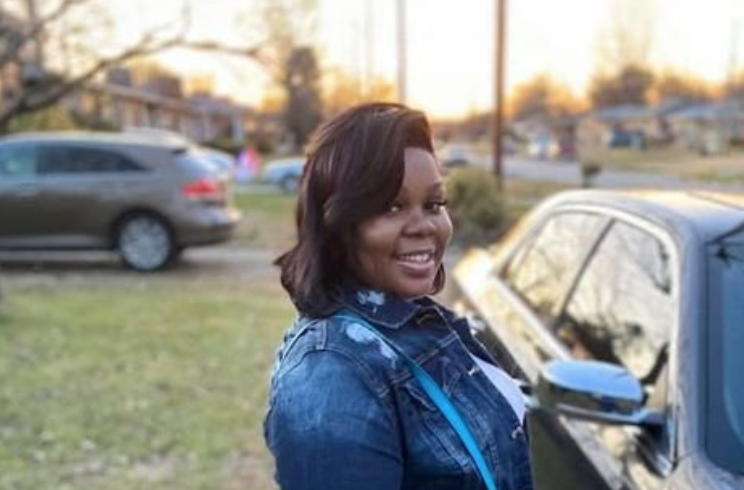“Arrest the cops who killed Breonna Taylor” started out as a rallying cry for the Black Lives Matter movement— but in attempts to spread awareness, her death has been co-opted by meme culture, dehumanizing Taylor into a symbol of performative allyship.
Breonna Taylor, a 26 year-old Black woman and emergency room technician, was sleeping on March 13, 2020 when police forcibly entered her Louisville home and shot her to death.
Shortly after her murder, many took to social media to voice their frustrations, reposting illustrations of Breonna Taylor and other victims of police brutality and sharing resources on how to help.
As calls to “arrest the cops who killed Breonna Taylor” entered the mainstream, however, so did memes about bringing attention to her murder.
okay the govt can ban tiktok now because at this point im done pic.twitter.com/CdiTbTuCRQ
— layla ☆彡 (@layzchipz) July 7, 2020
Stop fuckin doing this. Breonna Taylor’s life is not a meme. This is stupid and I’m tired of seeing it. pic.twitter.com/D9WHkZ3zch
— K E I S H (@MikeishaDache) June 30, 2020
"Arrest the cops who killed Breonna Taylor" becoming a meme instead of a deadly serious demand is some intensely frustrating shit
Do these people seriously think they're helping? This is not fun and games or a laughing matter it makes me sick pic.twitter.com/kEouKbTGnV
— Kevin DiBiase (@Hylianhero777) June 22, 2020
re-watching Friends and so far my favorite episode is “The One Where They Arrest The Cops Who Killed Breonna Taylor”
— Chris Garcia (@_chrisgarcia) June 19, 2020
https://www.instagram.com/p/CBiHAP1BTFc/
Critics of the memes point out that using the phrase “arrest the cops who killed Breonna Taylor” as a meme invalidates Taylor’s death.
https://twitter.com/africurls/status/1280693105013018624
Breonna Taylor was shot to death by police in her own home. She was shot 8 times. She did not deserve to die. Let’s amplify her name and her story and continue to take her death seriously. She is not a meme or a concept. She was a person and she should be alive.
— naf (@deadmetaphore) July 5, 2020
Can y'all ask for Justice for Breonna Taylor without all this other corny shit. She isn't a meme or a popular phrase. She was a soul that lost her life by the hands of the police. Please say her name and ditch that performative shit
— KC (@nigerianprynce) July 7, 2020
how did “arrest the cops who killed breonna taylor” become a meme ? i just saw some guy post a hiking thirst trap w the caption “it’s a great day to arrest the cops who killed breonna taylor” …. this is not about collecting woke points luv
— matt (@mattxiv) July 2, 2020
The death of a Black woman at the hands of a broken policing system shouldn’t be a punchline. It’s disrespectful to Breonna Taylor’s loved ones and the countless other victims of police brutality. When we dehumanize those victims, we trivialize the seriousness of their deaths. Breonna Taylor was a woman with aspirations, emotions, family and friends. Breonna Taylor was and is not a punchline.
Bre Day Was A Success! I’m Twenty-Fine Now Y’all ! ♊️💃🏾🍾💕 Happy Mfn Birthday To Me ‼️ pic.twitter.com/zntuH7bPYv
— Breeeee (@PrettyN_Paidd) June 6, 2018
I can’t make up my mind if I want a kid/kids or not …. y’all be making that shit look so easy but I know it’s probably hard trying to be a great parent
— Breeeee (@PrettyN_Paidd) February 19, 2020
Mf’s can say whatever tf they want about me, just don’t forget to mention: IM ON MY SHITTTT ‼️
— Breeeee (@PrettyN_Paidd) March 12, 2020
Memes come and go— so when Breonna Taylor’s death is used in a meme, it implies that speaking out against police brutality is a trend. Real change is ignited through permanently changing our cultural attitudes, not exploiting social media activism for digital clout or virtue signalling.
Breonna Taylor’s memeification fits into larger truths about the treatment of Black women in social media. From far-right conspiracy theories about Michelle Obama being transgender to Serena Williams being forced into the “angry Black woman” trope, perceptions in media tend to hypersexualize or objectify Black women for comedic purposes.
When Yung Miami got shot, social media laughed.
Meg the stallion got shit, social media laughed.
Breonna Taylor got killed and they turned her into a meme.
Are black women lives a joke to you all?— brittanymiller (@Bririxxx) July 16, 2020
Black women are often commodified into objects of humor on the Internet. In 2019, for instance, the second most-used GIF depicts a young Black girl angrily staring into the camera. Popular search results on GIPHY, a GIF-sharing site, include “sassy Black lady” and “angry Black lady.” GIF usage confirms the idea that Black women are squeezed into overly emotional, aggressive caricatures for Internet entertainment.
It is indisputable that our current wave of social media attention directed towards social justice has catalyzed the Black Lives Matter movement: petitions urging for legal accountability have been signed by millions, and Black-owned businesses have seen a surge in sales.
But we must acknowledge the role that media has in shaping our preconceived notions of Black women. Sharing memes of Breonna Taylor’s death perpetuates the stereotype that Black women are objects to be consumed for our entertainment.
Featured image via Twitter













